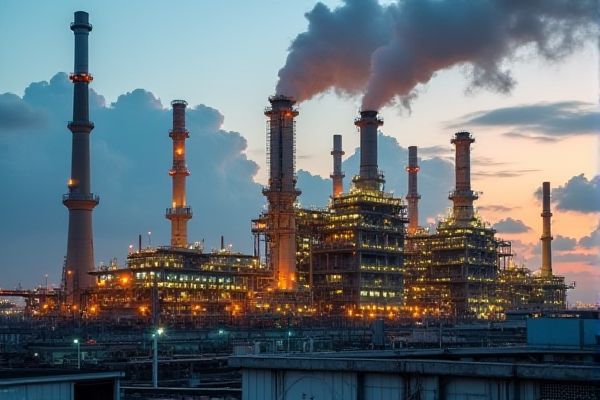
The power plant sector in the Philippines offers a range of job opportunities, driven by the country's increasing energy demands. Positions vary from engineering roles, such as electrical and mechanical engineers, to technical positions like turbine operators and control room technicians. Workers in management and administration, including project managers and safety officers, play crucial roles in ensuring efficient operations and compliance with regulations. With ongoing investments in renewable energy, individuals skilled in solar, wind, and hydroelectric systems are highly sought after, making it a promising field for career development.
Job Description
Power plant jobs in the Philippines involve various roles, including engineers, technicians, and maintenance personnel responsible for the operation and upkeep of energy-producing facilities. These positions typically require relevant educational qualifications in engineering, technology, or related fields, alongside certifications specific to the energy sector. Employees in this industry often work in shifts, ensuring continuous power supply while adhering to safety and environmental regulations. Opportunities for career advancement are available, enabling you to grow your professional skills in a rapidly developing energy market.
Requirement
Power plant jobs in the Philippines typically require a background in engineering, particularly in electrical or mechanical disciplines. Relevant experience in energy production or power generation can significantly enhance your application, showcasing your technical skills and understanding of industry standards. Familiarity with safety regulations and environmental compliance is crucial, as these are key considerations in the energy sector. You may also need to obtain specific certifications or licenses as required by the government or your employer to ensure adherence to local regulations.
Salary and Perks Expected
Power plant jobs in the Philippines offer competitive salaries, typically ranging from PHP 20,000 to PHP 70,000 per month, depending on the role and experience level. Many companies provide additional perks such as health insurance, transportation allowances, and performance bonuses, enhancing the overall compensation package. Opportunities in this field can be found across various regions, including Luzon, Visayas, and Mindanao, with renewable energy sources gaining traction. A career in this sector not only promises financial stability but also contributes to the country's energy needs and sustainability goals.
Similar Job Names
- Plant Manager
- Power Generation Engineer
- Control Room Operator
- Electrical Technician
- Mechanical Technician
- Safety Officer
- Operations Supervisor
- Project Engineer
- Maintenance Planner
- Instrumentation Engineer
- Environmental Compliance Officer
- Fuel Supply Coordinator
- Generation Analyst
- Quality Control Inspector
- Maintenance Supervisor
- Chemical Engineer
- Logistics Coordinator
- Field Operator
- Power Plant Scheduler
- Electrical Engineer
Job Expectation Concept
Power plant jobs in the Philippines require a strong foundation in engineering, technical expertise, and safety protocols. Workers are expected to handle operations efficiently, ensuring the optimization of energy production while adhering to environmental regulations. There is also a significant emphasis on teamwork, as collaboration among engineers, technicians, and management is crucial for maintaining facility reliability. Continuous training and professional development are essential for staying updated with advancements in energy technology and practices within the Philippine power sector.
Career Advantage and Weakness
Power plant jobs in the Philippines offer significant career advantages, including competitive salaries and opportunities for professional development. The increasing demand for energy in the country opens up various pathways for job security and advancement within the industry. However, these positions often entail demanding work schedules, which may affect work-life balance. You may also encounter challenges related to safety regulations and environmental compliance, necessitating ongoing training and adherence to strict protocols.
Important Thing Must Know
Power plant jobs in the Philippines are highly sought after due to the country's growing energy sector, which requires skilled personnel for operations, maintenance, and management roles. The industry offers various positions, including engineers, technicians, and operators, providing opportunities for both fresh graduates and experienced professionals. Many power plants promote a culture of safety and environmental sustainability, emphasizing the importance of responsible energy production. Training and certifications specific to local regulations can enhance your employability in this competitive field. Competitive salaries and benefits are common, making these jobs appealing for long-term career growth in a crucial industry for the Philippines.
Alternative Career Options
The Philippine job market offers a variety of alternative career options for individuals with power plant expertise. Opportunities exist in renewable energy sectors such as solar, wind, and hydroelectric power, reflecting the country's shift towards sustainable practices. Positions in energy management and efficiency consulting are also growing, allowing you to leverage your technical skills to optimize energy use in various industries. Moreover, roles in regulatory agencies or the energy sector's workforce development can further expand your career trajectory beyond traditional power plants.
Companies List
- Aboitiz Power Corporation
- Energy Development Corporation
- Manila Electric Company (MERALCO)
- First Gen Corporation
- National Power Corporation
- San Miguel Corporation
- Ayala Corporation
- Phinma Energy Corporation
- Semirara Mining and Power Corporation
- SPC Power Corporation
List of Ideal City
Cities in the Philippines that offer promising opportunities for power plant jobs include Calaca, known for its coal-fired power station, and Batangas City, which hosts both renewable and non-renewable energy facilities. Cebu City is another key hub, with its growing investments in energy projects and infrastructure development. Davao City attracts talent with its expanding industries and emphasis on sustainable energy solutions. The blend of rapidly developing energy sectors and a skilled workforce makes these cities ideal for pursuing a career in power generation.
 jobs-philippines.com
jobs-philippines.com